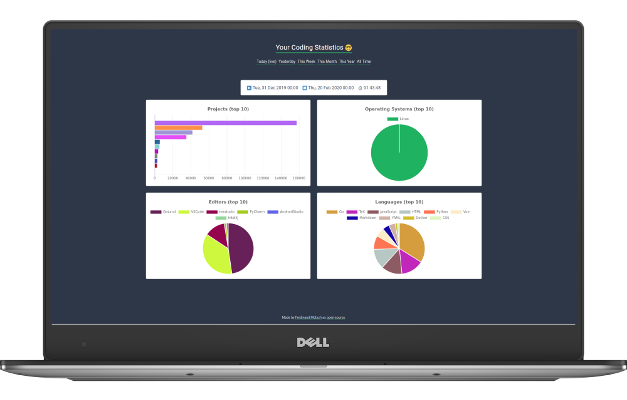📈 wakapi
A minimalist, self-hosted WakaTime-compatible backend for coding statistics
If you like this project, please consider supporting it 🙂. You can donate either through buying me a coffee or becoming a GitHub sponsor. Every little donation is highly appreciated and boosts the developers' motivation to keep improving Wakapi!
👀 Hosted Service
🔥 New: Wakapi is available as a hosted service now. Check out wakapi.dev. Please use responsibly.
To use the hosted version set api_url = https://wakapi.dev/api/heartbeat. However, we do not guarantee data persistence, so you might potentially lose your data if the service is taken down some day ❕
⚙️ Prerequisites
On the server side:
- Go >= 1.13 (with
$GOPATHproperly set) - gcc (to compile go-sqlite3)
- Fedora / RHEL:
dnf install @development-tools - Ubuntu / Debian:
apt install build-essential - Windows: See here
- Fedora / RHEL:
- Optional: A MySQL- or Postgres database
On your local machine:
- WakaTime plugin for your editor / IDE
⌨️ Server Setup
Run from source
- Clone the project
- Copy
config.default.ymltoconfig.ymland adapt it to your needs - Build executable:
GO111MODULE=on go build - Run server:
./wakapi
As an alternative to building from source you can also grab a pre-built release. Steps 2, 3 and 5 apply analogously.
Note: By default, the application is running in dev mode. However, it is recommended to set ENV=production for enhanced performance and security. To still be able to log in when using production mode, you either have to run Wakapi behind a reverse proxy, that enables for HTTPS encryption (see best practices) or set security.insecure_cookies to true in config.yml.
Run with Docker
docker run -d -p 3000:3000 --name wakapi n1try/wakapi
By default, SQLite is used as a database. To run Wakapi in Docker with MySQL or Postgres, see Dockerfile and config.default.yml for further options.
🔧 Configuration
You can specify configuration options either via a config file (default: config.yml, customziable through the -c argument) or via environment variables. Here is an overview of all options.
| YAML Key | Environment Variable | Default | Description |
|---|---|---|---|
env |
ENVIRONMENT |
dev |
Whether to use development- or production settings |
app.cleanup |
WAKAPI_CLEANUP |
false |
Whether or not to clean up old heartbeats (be careful!) |
app.custom_languages |
- | - | Map from file endings to language names |
server.port |
WAKAPI_PORT |
3000 |
Port to listen on |
server.listen_ipv4 |
WAKAPI_LISTEN_IPV4 |
127.0.0.1 |
Network address to listen on |
server.base_path |
WAKAPI_BASE_PATH |
/ |
Web base path (change when running behind a proxy under a sub-path) |
security.password_salt |
WAKAPI_PASSWORD_SALT |
- | Pepper to use for password hashing |
security.insecure_cookies |
WAKAPI_INSECURE_COOKIES |
false |
Whether or not to allow cookies over HTTP |
db.host |
WAKAPI_DB_HOST |
- | Database host |
db.port |
WAKAPI_DB_PORT |
- | Database port |
db.user |
WAKAPI_DB_USER |
- | Database user |
db.password |
WAKAPI_DB_PASSWORD |
- | Database password |
db.name |
WAKAPI_DB_NAME |
wakapi_db.db |
Database name |
db.dialect |
WAKAPI_DB_TYPE |
sqlite3 |
Database type (one of sqlite3, mysql, postgres) |
db.max_conn |
WAKAPI_DB_MAX_CONNECTIONS |
2 |
Maximum number of database connections |
💻 Client Setup
Wakapi relies on the open-source WakaTime client tools. In order to collect statistics to Wakapi, you need to set them up.
- Set up WakaTime for your specific IDE or editor. Please refer to the respective plugin guide
- Make your local WakaTime client talk to Wakapi by editing your local
~/.wakatime.cfgfile as follows
api_url = https://your.server:someport/api/heartbeat`
api_key = the_api_key_printed_to_the_console_after_starting_the_server`
You can view your API Key after logging in to the web interface.
🔵 Customization
Aliases
There is an option to add aliases for project names, editors, operating systems and languages. For instance, if you want to map two projects – myapp-frontend and myapp-backend – two a common project name – myapp-web – in your statistics, you can add project aliases.
At the moment, this can only be done via raw database queries. For the above example, you would need to add two aliases, like this:
INSERT INTO aliases (`type`, `user_id`, `key`, `value`) VALUES (0, 'your_username', 'myapp-web', 'myapp-frontend');
Types
- Project ~ type 0
- Language ~ type 1
- Editor ~ type 2
- OS ~ type 3
- Machine ~ type 4
🔧 API Endpoints
The following API endpoints are available. A more detailed Swagger documentation is about to come (#40).
POST /api/heartbeatGET /api/summarystringparameterinterval: One oftoday,day,week,month,year,any
GET /api/compat/wakatime/v1/users/current/all_time_since_today(see Wakatime API docs)GET /api/compat/wakatime/v1/users/current/summaries(see Wakatime API docs)GET /api/health
⤴️ Prometheus Export
If you want to export your Wakapi statistics to Prometheus to view them in a Grafana dashboard or so please refer to an excellent tool called wakatime_exporter.
It is a standalone webserver that connects to your Wakapi instance and exposes the data as Prometheus metrics. Although originally developed to scrape data from WakaTime, it will mostly for with Wakapi as well, as the APIs are partially compatible.
Simply configure the exporter with WAKA_SCRAPE_URI to equal "https://wakapi.your-server.com/api/compat/wakatime/v1" and set your API key accordingly.
🏷 Badges
We recently introduced support for Shields.io badges (see above). Visit your Wakapi server's settings page to see details.
👍 Best Practices
It is recommended to use wakapi behind a reverse proxy, like Caddy or nginx to enable TLS encryption (HTTPS).
However, if you want to expose your wakapi instance to the public anyway, you need to set server.listen_ipv4 to 0.0.0.0 in config.yml
⚠️ Important Note
This is not an alternative to using WakaTime. It is just a custom, non-commercial, self-hosted application to collect coding statistics using the already existing editor plugins provided by the WakaTime community. It was created for personal use only and with the purpose of keeping the sovereignity of your own data. However, if you like the official product, please support the authors and buy an official WakaTime subscription!
📓 License
GPL-v3 @ Ferdinand Mütsch




